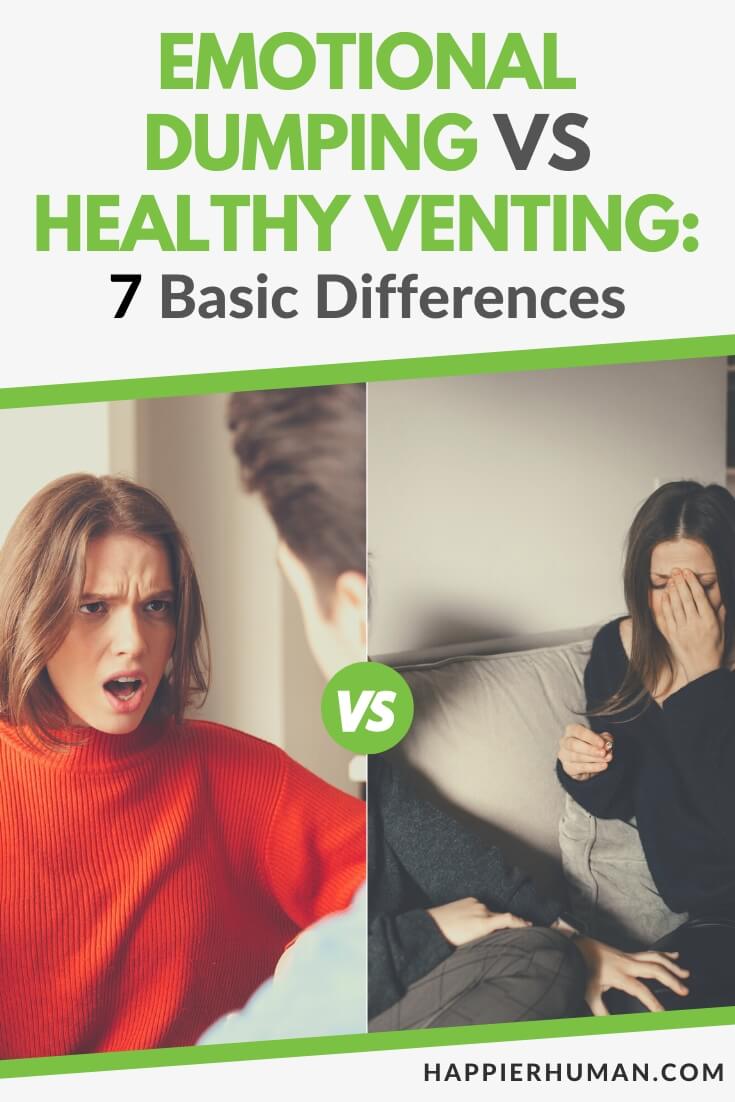There might be affiliate links on this page, which means we get a small commission of anything you buy. As an Amazon Associate we earn from qualifying purchases. Please do your own research before making any online purchase.
At the stable yard where I was a manager, there was one fellow horse owner who loved to hang over my stable door every afternoon and dump all of her problems on me, my horse, the floor, or the wall. She never seemed to care whether I was actively listening or whether I was part of the conversation.
It always felt like verbal vomiting or, better yet, verbal projectile vomiting. Ew, right?
People who think they are sharing and venting in a healthy way may, in fact, be emotionally dumping all their crap (yes, crap!) — their life story, complaints about everything big and small, and more — on you.
If you aren’t sure whether you fall in the toxic or healthy category of emotional dumping vs venting, here’s everything you need to know, including the main differences. This guide is also for you if you aren’t sure whether your partner, bestie, boss, or colleague dumps or vents.
What Is Emotional Dumping?
Emotional dumping, also called trauma dumping, is when a person vents or goes off on an angry and frustrated tirade at a toxic level. They overshare intimate stories or information you don’t normally blurt out without considering the situation, environment, or the other person.
When a person info dumps, they relive the past or they go on and on about what’s wrong in their life. This becomes easily addictive, and usually, the person who overshares isn't even aware of what they are doing or the effect this has on their victims.
When you are on the other end of emotional dumping (the receiving side — aka getting dumped on), you feel left out, completely drained and exhausted, and excessively frustrated. You can even feel helpless, because you want to help, listen, and support the person, but in reality, there’s nothing you can do.
You try to talk to them and offer suggestions or advice, but they just carry on and on, talking over you or interrupting you to dump even more. If you know someone who dumps their crap on you regularly, you also know how tiring this is and how worn down you feel.
You are stuck, “listening” to them, when all you want to do is walk or run away. There is no value or true connection; it’s a chronic complaining session where the person may believe they are trying to find a solution and connection, but they never do anything to fix their circumstances. It’s a one-way “conversation” directed at you.
When they start dumping their complaints on you, you soon realize it’s like a broken record player — they complain about the same things over and over again.
The person who trauma dumps actually just wants sympathy or empathy, that “Oh, poor Susan” or “poor Johnny has it so hard” kind of response (more sympathy because they want to feel like a victim). This kind of validation makes you feel extremely awkward because what they are sharing makes you feel uncomfortable.
And soon, you’ll feel resentment toward that person for all the inappropriate sharing they are doing. And they’ll resent you since you’ll start avoiding them and distance yourself from them.
What Is Venting?
Venting is like emotional dumping’s healthy cousin. When you vent to someone, you intentionally share your feelings, thought processes, emotions, and frustrations with another person. The aim of venting is to help you feel better and discuss negative emotions, reduce stress, potentially to find a solution, and receive honest feedback.
While you can vent in a healthy manner when you are hyped up, the healthy aspect usually comes in because you’ve had time to cool down so you can share when you are in a more positive mindset. This has much more healing power.
You consider whom you are venting to, whether it’s appropriate to vent at this very minute, and the other person’s emotional state. You may also ask for permission before you just verbally vomit or vent. For example, you may ask something like, “I need to get something off my chest. Is it okay if I vent for 5 minutes?”

This shows that you are aware of what you are about to say and how you are about to say it (pending the other person saying yes). When venting, you show that you are emotionally aware because you vent in a way that’s self-reflective and not reactive (or just explosive).
The venting session is a two-way conversation because both you (the person who is venting) and the other person, usually a confidant, actively and empathically listen to each other, show empathy, and participate.
7 Differences between Emotional Dumping vs Venting
It’s not easy to distinguish between emotional dumping vs venting, and many people consider them to be the same.
When I asked my reflexologist out of curiosity if she knew the differences between info dumping and venting, she looked quite perplexed. So you aren’t alone if you thought they were one and the same – up until now.
It is necessary to know that venting and emotional dumping aren’t the same, and here are the main differences:
1. Why You Share
One of the main differences between emotional dumping and healthy venting is the intent with which the person shares what’s on their heart.
Do you just overshare because you can and want people to feel sorry for “sad little Sally,” or do you want to take action and share to heal?
Emotional dumping: When someone verbal vomits all their traumas, dramas, and complaints on (or should that be all over) you, they aren’t aware that they are dumping. For them, it’s about unburdening their soul so that everyone will feel sorry for them and agree that it’s the whole world that’s against them. They overshare because it suits them, with no regard for anything or anyone.
Healthy venting: When you vent in a healthy manner, you practice self-awareness because you share with intent. You are intentional in whom you share with, that person’s emotional state, what you share, and where you share. You share to feel better but also to find a solution and get genuine feedback about what has happened or what’s bothering you.
2. Where Do You Place the Blame
Placing blame plays a big part in whether you dump on someone by going off in a tirade or whether you share with intent (aka vent). And are you even aware where you are placing blame?
Emotional dumping: If you are dumping on someone, you most likely have a victim mentality. Nothing is ever your fault, and it’s your family and friends, colleagues and boss, strangers, and the whole world and beyond that’s out to get you. Things happen TO you when you have a victim mentality (and you don’t realize that you play an active role in your life and what you make of it) and you surely don’t take responsibility for any of it.
While you blame everyone else, you may also constantly put them down while blowing your own horn. Whether you are the hero or victim in your story depends on what you share and whether you want praise or sympathy.
Healthy venting: When you vent, you are aware that you are a participant in your own life, not just someone that things and events happen to. So you don’t blame anyone for what happened; just know all the parties involved played a role. Recounting the events during your vent session, you are more objective about what happened, and with some introspection, you can see the bigger picture and understand the “why.”
3. Toxic vs Beneficial and Healthy
When someone opens up to you, how do you feel? Does the whole ordeal feel like a toxic mess, where you are totally drained afterward? Do you think “uhg, not again” when they show up or when you see them? Do you wish the earth would swallow you whole just so you could escape?
Or does the sharing session feel healthy and productive? Like you participate in the conversation and the person who shares actually wants to talk to you and wants your advice? Do you feel positive afterward and good about yourself because you helped, listened to, and supported someone you care about?
Emotional dumping: An emotional dumping session is wholly toxic. The person doesn’t take you or your surroundings into consideration, and they certainly don’t care what they share.
We can probably all tell a story about that one person who was in a public restroom and how they emotionally dumped all their secrets and intimate details on whomever was on the other end of the phone call. Exactly. You cringed and wished you were anywhere but there in that moment.
So if you are on the receiving end of a “dump” (pardon the pun), you also just want to escape when the person overshares and goes on and on about what’s wrong in their life. It’s like a sewage pipe that bursts, and all the garbage (aka information you don’t need to know and don’t want to know) rains down on you.

Healthy venting: A healthy venting session actually feels good, both for the person who vents and for the person who listens. You both participate in the conversation by listening and talking. The person who shares will talk about what happened and listen to any advice or suggestions you have, while you listen while they talk, ask clarifying questions, give feedback.
It’s very much a two-way street, and you don’t leave the conversation feeling like you hope to never see the person again, wishing you could be anywhere else, or exhausted because you were info dumped on. You feel like you helped and that you were there for the person who clearly wanted to share with you.
4. Sympathy vs Empathy
Sympathy is a feeling when you feel sorry for someone and you are relieved that you don’t have the same issues as another person. On the other hand, empathy is a feeling of compassion and an understanding of how the person feels.
Emotional dumping: The person who trauma dumps on you simply wants sympathy. They want you to feel sorry for them, pity them, and “oh, poor Percy” them. Remember, they have a victim mentality, where they blame everyone and everything but themselves for what’s happening in their life. They want you to listen to them, nod your head and agree with them, and that’s it.
Healthy venting: When it comes to a healthy venting situation, empathy is on the menu. While the person who vents may not want outright empathy, they are sharing with you so you can help them, such as by giving them your honest opinion about what happened and how you see things. They’ll also potentially want your help in problem-solving the situation or giving them tips for what they can do next.
Helping them is so much easier when you can put yourself in their shoes and understand what they are feeling and why. Thus, empathy plays a significant role when you or a close friend or family member vents.
5. What You Share
There’s a huge difference in what you share when you vent compared to when you just dump all your stuff on someone else.
Emotional dumping: Emotionally dumping all your issues onto someone is an uncontrolled way of sharing. You either overshare or go off on long-winded rants, or both. And with this, you completely take over the conversation. It’s all about you, and then there’s more you. It doesn’t even really matter whom you are “sharing” with.
You may spend 20 minutes (or more) on one issue, how your boss is the big bad wolf who didn’t promote you over pregnant Annie, or you share intimate details about your life, from how your husband cheated on you to the gory details of your big toe surgery and aftercare (with pictures to boot).
You may also jump from one topic to the next, reciting everything you are angry about, from the boss who didn’t promote you and the colleague who spilled her coffee on you to your kids who were naughty and your needy mother.
Healthy venting: When you vent, you are in control. You decide what you want to share and how much you want to reveal to your confidant, and you are also aware of how long you spend on venting. You don’t monopolize the other person’s time, and you share in a more objective way because you want to find a solution or get advice on the way forward.
A venting session may just be about how your job interview didn’t go well, and you may ask your friend for tips on what you can do better next time. You detail what you think went wrong and why, and then it’s a give and take between you and your friend about the next steps or how you can improve your interview skills.
6. The Role of Social Cues
Social cues include a person’s body language, expressions, personal space, and tone of voice, and all of these help us communicate effectively and efficiently.
So what role do social cues play in venting versus dumping?
Emotional dumping: When you trauma dump, you just open your mouth and forth spills all your feelings and thoughts. It’s like you opened a water tap too much and the receiving container is way too small. You just carry on and on about what you are upset about, and you simply ignore the listener (and their signs of discomfort or that they aren’t paying attention, because eventually, the listener does switch off if you’ve dumped on them a time too many).

Healthy venting: A person who vents is very much aware of themself and the listener. They take note of various social cues, and the whole exchange is one of reciprocation. The listener here also notes the venter’s body language and tone of voice to help them respond more appropriately.
7. Swaying Your Perspective vs Not
Another difference in whether someone is venting or they are dumping is in what they are saying.
Do you feel like they are trying to convince you of their story and how they are being victimized? Or do you feel like you are respected and that you aren’t accused of taking sides when you share your opinion and thoughts?
Emotional dumping: A person who emotionally dumps will try very hard to sway your perspective so you can see things from their side and feel sorry for them. It’s very much a manipulation tactic, as they take advantage of you when they overshare or rant.
Healthy venting: When you vent in a healthy and constructive manner, you care about the person who is listening and know that if they air their point of view they aren’t taking sides. You simply feel heard and understood as they respond to your emotions and the situation.
Final Thoughts on Emotional Dumping vs Venting
It’s very possible that you’ve been part of a dumping and a venting session, whether on the “receiving end” or the person who goes off on a tirade or intently shares. If you’ve ever thought that emotional dumping and healthy venting were the same thing, you now know better. They are very different.
When something happens in your life that you want to talk about, pause and take a moment. Decide what you will share, how, with whom, and where, so you are in control. Take note of social cues and the person’s mental state so you don’t overwhelm and exhaust them. I know you don’t want to be another unhealthy person in their life.
Not quite sure about the differences between what constitutes a healthy relationship and ones that are unhealthy? Then check out our detailed guide about the 7 important differences between a toxic vs healthy relationship.
And if you're looking for more resources on different emotions, be sure to check out these blog posts:
- 71 Negative Emotions: A List of Negative Feelings Examples
- Humbleness VS Humility: 5 Basic Differences
- Emotions VS Feelings: 7 Important Differences

Rain Story is an author and screenwriter. She is an alumna of the University of Arkansas at Little Rock, the University of New Mexico, and the University of Kentucky. She earned two B.A.s and four years of graduate studies in literature, languages, and creative writing before personal tragedies pulled her away from her graduate work. She is also a Donaghey Scholar and fellow of the William G. Cooper, Jr. Honors Program in English.


